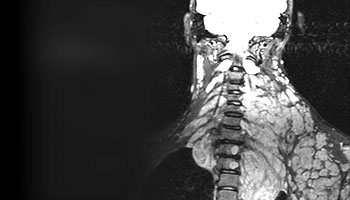HOW CAN WE HELP YOU? Call 1-800-TRY-CHOP
In This Section
Does Cabozantinib Treat Plexiform Neurofibromas in Neurofibromatosis Type 1?

Preclinical study results show cabozantinib is a potential new treatment for tumors associated with neurofibromatosis type 1.
The findings:
Nearly half of patients with neurofibromatosis type 1 (NF1) who were treated with cabozantinib, an RTK inhibitor, in a phase 2 clinical study experienced at least a 20 percent volume reduction of their plexiform neurofibromas.
Why it matters:
NF1 is a rare disease that affects one in 3,000 people worldwide. It is a tumor predisposition syndrome that manifests with plexiform neurofibromas, which are tumors that arise in the nerves, grow rapidly during childhood, and can lead to pain, disfigurement, and impaired function. Plexiform neurofibromas can transform to malignant sarcomas that are often aggressive and fatal. In 2020, the U.S. Food and Drug Administration approved selumetinib, a MEK inhibitor, to treat plexiform neurofibromas; however, this treatment does not work for all patients. Cabozantinib is in a different class of agents that target the tumor microenvironment. This mechanism of action was highly effective shrinking plexiform neurofibromas in mouse models.

Imaging of neurofibromatosis type 1 tumors
Who conducted the study:
Michael J. Fisher, MD, chief of the Section of Neuro-Oncology and director of the Neurofibromatosis Program at CHOP, was the first author of the paper. Dr. Fisher is group chair for the NF Clinical Trials Consortium, which includes 25 sites working on NF clinical trials. The clinical trial collaboration included CHOP and 13 other institutions, and grew out of laboratory work performed with collaborators at Riley Hospital for Children. The research received support from an NF Clinical Trials Consortium award from the Department of Defense NF Research Program, a Developmental and Hyperactive Ras Tumor SPORE funded through the National Institutes of Health’s National Cancer Institute, and Exelixis, the drug manufacturer.
How they did it:
This phase 2 trial included participants age 16 years and older with NF1 and either progressive or symptomatic plexiform neurofibromas that were not treatable by surgery. Eligible patients received cabozantinib daily for up to 24 cycles. The patients underwent magnetic resonance imaging to determine the response to treatment. Partial response was defined as at least a 20 percent reduction in tumor volume. The researchers also evaluated safety and tolerability, pain, and quality of life.
Quick thoughts:
“It’s incredibly exciting that we now have two classes of drugs that result in tumor responses, given that we had no promising agents only a few years ago,” Dr. Fisher said. “However, despite this excitement, neither cabozantinib nor MEK inhibitors shrink all tumors or make them go away completely. Therefore, we are building on these results as well as ongoing laboratory studies and are planning future exploration of combination therapies, so that we can further improve outcomes for these patients with these debilitating and life-threatening tumors.”
What’s next:
Based on these preclinical findings, the NF Clinical Trials Consortium opened a pediatric study cohort that includes patients ages 3 to 15 years. Enrollment for this study is complete, and the research is ongoing.
Where the study was published:
The study appeared in Nature Medicine. Read more about it in the CHOP press release.


